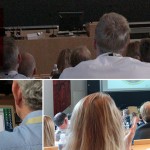A forgotten Space Age technology could change how we grow food
Dr. Lisa Dyson is the CEO of Kiverdi, a technology company that develops innovations which aim to surpass our traditional agricultural methods, in order to discover new ways of growing food and sustaining our ever-increasing world.
In an informative and motivating TED Talk, Lisa Dyson explains how an idea developed by NASA in the 1960s for deep-space travel could be the key to reinventing how we grow food.
NASA figured out how to produce food with minimal effort. Their idea involved microorganisms and the use of hydrogen from water. By making use of a special type of microbes, called hydrogenotrophs, they were able to create a carbon cycle that would sustain life onboard a spacecraft.
Starting from these ideas, Dr. Lisa Dyson and her colleague Dr. John Reed, wanted to come up with technical solutions to address climate change, as their main interest was that of finding new ways recycling carbon of here on Earth.
This is how they started a company and discovered that these hydrogenotrophs “are a powerful class of microbes that…could make some really valuable products.”
After cultivating these microbes and creating all kinds of products, such as essential amino acids, meals, oils etc., they began working with manufacturers to scale up this technology in the hopes of bringing these products to the market.
Lisa Dyson further explains that this technology could greatly change our future as
“it can actually help us address an issue with agriculture and allow us to create a type of agriculture that’s sustainable, that will allow us to scale to meet the demands of tomorrow.”
Sustainable agriculture is a must, as it is estimated that the population will reach about 10 billion by 2050, and that we will need to increase food production by 70%.
Dyson claims that by implementing this type of approach and using these carbon recyclers, we wouldn’t have to worry about the future, as we could actually make 10,000 times more output per land area than it is possible now.
Lisa Dyson – CEO of Kiverdi – holds a PhD in physics from MIT and has done research in bioengineering, energy and physics at Stanford University, UC Berkeley and Princeton University.
Video source: Lisa Dyson (2016), A forgotten Space Age technology could change how we grow food, TEDTalks

Tags: Agriculture performance, Innovation, Multimedia, Sustainability performance





